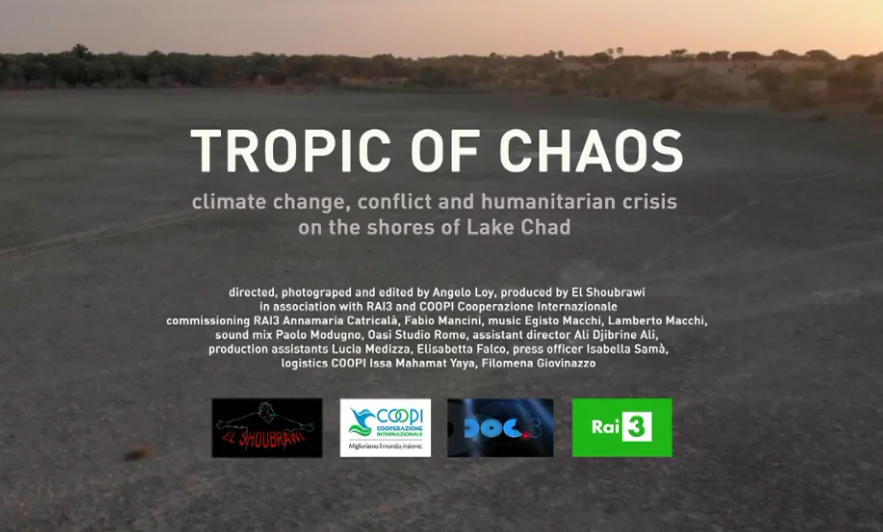When filmmaker Angelo Loy wrote to offer his film to this blog, we all received an immense gift—the voices of and views from dozens of people in central Africa.
As you watch Tropic of Chaos you will come to know a vast region. You will meet people living on Lake Chad’s receding shores who invite you into their lives. They will tell how their communities once thrived together around a huge expanse of living water. They will show how climate change, colonization, illiteracy, and poverty have been erasing their music, rituals, languages, fields, herds, and ways of life. They will explain the rise of Boko Haram and the reasons that thousands must migrate.
I ask you to join with these communities by witnessing and hearing. While the situation they face is dire, you will also recognize the beauty and complexity of the land and of the people as they regroup and search for ways forward.
Loy has been a social documentary filmmaker and a participatory video facilitator for two decades. He and I have considered ways to support the men and their solar power project or the women who are finding new ways to feed their children. The small local projects are the ones, Loy points out, that are most likely to succeed. Global witness and connection are needed.
With immense thanks to all who agreed to be filmed, we refer you to Tropic of Chaos. You will be able to view the film at https://vimeo.com/333525345 using the password tropic.
Consider responding to one of these queries (questions meant to be pondered and answered with humble care) after you have watched the documentary.
- Are there words you’d like to say to the people in the documentary? If there are, please send them to me (click on contact above) or post them in the comments below. I’ll gather them and ask Angelo to translate them and get them to at least some of the people he filmed.
- Angelo pointed out to me that all the voices in the film are from local people. He is aware that he himself is not native to that region. Are there elements that you think his outsider view affected? Would you suggest any corrections or changes?
- How do or how could the people in this documentary get their voices to the wider world?
- I am aware that seeing the difficulties that others face can be painful. What might make you feel that you have responded with respect and care to the people and other beings in this film? What might ease your own heart?
- What actions (or cessations of actions) might we take that could relieve the causes of these problems or move toward ecosystem adaptation?
I want also to call attention to Adenike Oladosu, a young climate activist from the Lake Chad area. You can read about her more at https://en.wikipedia.org/wiki/Adenike_Oladosu; there you will find links to more information.

Thank you for posting this, Ranae. And, Loy, thank you for creating this film. You draw with clarity the connections between climate, poverty, hunger, displacement, loss of culture and vocation, Boko Harum. I appreciate your pointing out that small local projects are most likely to succeed. I am glad you included the women’s project. I would like to have heard more of their voices throughout the film. Again, thank you!
To the people in the video, I want to say you have touched my heart. I will not forget you and will share your video with others so that as the number of concerned people can expand and with your input we can work towards a solution.
I watched the film and it really reminds me of refugee camps in Kenya. The women’s association in the film are similar to the MOSOP association in the Ogoni region. I watched the Aral sea that also dried up just like Lake Chad.
Ranae-thank you for sharing the Tropic of Chaos and for sharing your knowledge and helping us see through. Thank you.
Life is connectedness, entangled relationships between humans and their environment, a dance of divine atoms.
Some of the symptoms I saw described in the Tropic of Chaos was desertification, irregular rains, scarcity of crops, crop prices rise, scarcity of water, tribal fights, immigration, and terrorism. What is the root and solution to the problem? We “search for the key inside our prison” citing Angelo Loy.
Ignorance. Lack of accountability. It is not mine, do not care. Exploitation mindset. Come to mind.
Ecological equilibrium is altered, broken, and humans cannot find peace. Take time for nature to heal and recover.
Most of our current problems are rooted in the lack of seeing and understanding how all kinds of life are interconnected. We are all living organisms that respire, consume energies, communicate, exchange atoms and we are all changing life as we go along in the watershed…because of our connectedness.